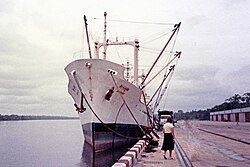
Nigerian ethnicity indicates genetic origins in Nigeria, which is located on the coastline of the Gulf of Guinea in West Africa, and houses a diverse ecology, ranging from sprawling grass savannas in the north to lush tropical rainforests in the south. However, as the most populous country in Africa with 170 million citizens, its greatest diversity lies in its population: Nigeria is home to 250 sub-ethnic groups, the largest of which are the Esan and the Yoruba. Due in part to the dark history of the Atlantic slave trade as well as to major waves of modern migration, people of Nigerian descent are found all over the world. The Nigerian diaspora is estimated to be between 5 and 15 million people, with the largest populations found in the United Kingdom, the United States, Ireland, Dubai, and South Africa.
Research your ancestors on MyHeritage
Nigerian history

The oldest known organized society in Nigeria is the Nuk culture (500–200 B.C.E.), renowned for its distinctly styled terracotta figurines. It has been suggested by researchers that elements of Nuk cultural legacy persist in Nigeria to this day. By the 8th century, Arab geographers noted the Kanem Empire, located at the southern end of the trans-Saharan trade route, ruling over areas in modern-day Nigeria, Chad, and Libya. By the 14th century, the Kanem Empire had broken apart and the Bornu Empire was established in its wake. In the northwestern plains, during the 1st millennium C.E., a collection of centralized polities established by the Hausa people in the northern plains of Nigeria consolidated and formed the Hausa Kingdom, which persisted until the 19th century.
In the southwest, the Yoruba kingdom of Ife sprang up between the 11th and 12th centuries. Ife is heralded by many as the geographical and spiritual ancestral home of the Yoruba; many characteristic features of Yoruba culture emerged during this period, including a monarchical system based on city-states and surrounded by villages, and a local pantheon of gods. Ife was ultimately supplanted by the Kingdom of Oyo. At its peak, during the 17th to early 18th century, Oyo was able to extend its influence from western Nigeria to modern-day Togo. At the same time, southern Nigeria was ruled by the Kingdom of Benin. Established as early as the 11th century, the powerful Kingdom of Benin gave its name to the Bight of Benin in the Gulf of Guinea.

In the 16th century, Portuguese and Spanish explorers began trading with locals in the port of Calabar, situated on the Cross River by the modern-day border with Cameroon. Iberian merchants also conducted trade in a small port on the Bight of Benin which they named Lagos; the small port eventually evolved into the largest city in the region and served as the capital of independent Nigeria until 1991. During the Atlantic slave trade period, the ports of Calabar and Lagos became major stations in West Africa. The Bight of Benin, in particular, is associated with the slave trade, as its shores are known as the Slave Coast of West Africa.

As part of a broader campaign to abolish the Atlantic slave trade, Britain increasingly meddled in the affairs of Lagos until finally annexing the port city as a Crown Colony in 1861. Following the Berlin Conference of 1884–85, Britain asserted its control over large parts of West Africa, and in 1901, Nigeria became a British protectorate. Nigeria gained its independence in 1960, becoming a member of the British Commonwealth of Nations. Following a brief period of cooperation, long-standing regional and ethnic tensions resurfaced. Successive conflicts and a breakdown of state institutions culminated in back-to-back military coups, at the end of which the country’s southern region declared its independence as the Republic of Biafra. The central Nigerian government’s attempt to recapture Biafra led to a bloody 30-month civil war, resulting in an estimated 3 million casualties. Military juntas maintained their seat of power in Nigeria until 1999, when a new constitution was adopted and allowed multiparty elections. Today, Nigeria is a member of the United Nations and founding member of the African Union.
Nigerian culture

Across the country, Nigerian cuisine is rich, colorful, and flavorful, relying on a variety staple foods high in carbohydrates, such as cassava (a type of woody shrub), rice, maize, yams, and other vegetables. Firm-cooked doughs dipped in a variety of soups are common in Nigerian cuisine, including fufu — made from boiled starchy food crops like cassava, yams, or plantains and commonly served with peanut or palm-nut soup — or eba, made from dried grated cassava flour and commonly served with okra soup. Suya, a spicy meat skewer usually made with beef, ram, or chicken, enjoys great popularity, while wild meat — including giraffe and antelope — is another local delicacy.
Employing wood, brass, and terracotta, the art of the Yoruba is considered to be one of the finest artistic traditions in Africa. Traditional Yoruba sculpture mostly depicts the human form, with an emphasis on the human head. Music and dance are integral to Nigerian culture, and each ethnic group has its rhythmic and melodic traditions, produced through an assortment of instruments including various types of flutes, trumpets, xylophones, and many varieties of drums. The most famous contemporary Nigerian musician is the internationally esteemed Fela Kuti (1938–1997), pioneer of the Afrobeat music genre. In 1986, the Nigerian playwright and author Wole Soyinja became the first African to be awarded the Nobel Prize in Literature.
Nigerian languages
Nigeria’s ethnic diversity is reflected in the plethora of languages spoken across the country. Numbering over 500, they are derived from Africa’s three major language families: Afroasiatic, Nilo-Saharan, and Niger–Congo. While English is the official language and lingua franca spoken across communities and ethnicities in the country, the most common native languages in Nigeria are Hausa, Yoruba, Igbo, Fulfulde, Ibibio, Kanuri, and Tiv.
Explore more about ethnicity estimates
- MyHeritage DNA at MyHeritage
- Ethnicities around the world at MyHeritage
- What Is My Ethnicity? How MyHeritage Estimates Ethnicities at MyHeritage Knowledge Base
- Where's My Ethnicity?!: Why An Ethnicity Might Not Show Up In Your DNA (and How To Find Evidence Of It Anyway) at MyHeritage Knowledge Base


